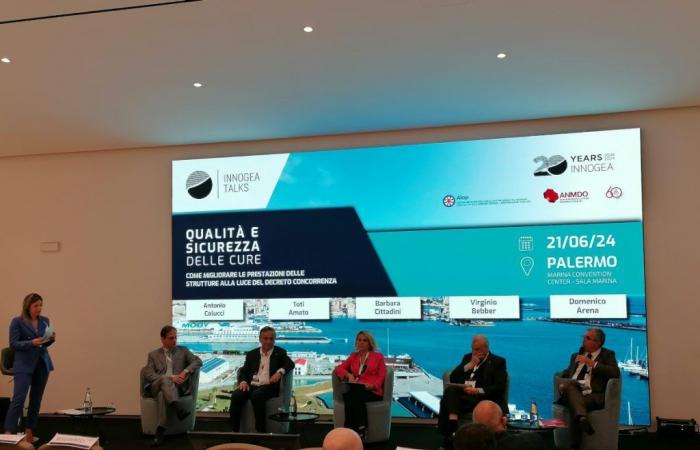
PALERMO (ITALPRESS) – A discussion table on the healthcare of the future in light of the recent measures implemented by politics, as long as there are quality structures and high-level performances at the center: this is the aim of the first ‘Innogea Talks’, organized in Palermo Marina Yachting in the presence of numerous representatives from the world of institutions, politics and healthcare.
The title of the talk, promoted by Innogea twenty years after its establishment, is ‘Quality and safety of treatments: a path that both the local structures and the National Health Service aim to follow, using moments of discussion like this to outline together possible solutions that have the well-being of citizens as their priority.
The event was introduced by the greeting of the mayor Roberto Lagalla, who has worked in the healthcare sector for many years with multiple skills: “The public system is not always able to support the battle of innovation. Healthcare has profoundly transformed in recent decades, becoming a sustainable condition of well-being: we do not look at health itself, but at its conditions of interaction with the environment through prevention strategies. Today, alongside the quality of medical and healthcare provision, we must have optimal organisation: I trust that the regional government can use great energy and resources to protect the healthcare sector”.
Lagalla then highlights how “the activation of good practices on organizational models and rationalization of spending become fundamental elements so that the process of advancing healthcare can be consolidated. In Sicily, in particular, the uncertainty is linked to a recovery plan dating back 18 years ago: a rethink and adaptation to the current reality is necessary, but at the same time certainties are needed at a national level regarding the application of autonomy differentiated, therefore on the possibility of not having setbacks in terms of financing and the recognition of equal opportunities”.
For the president of Innogea Marco Lampasona, improving the quality of care also involves events like today’s, made up of “comparison and sharing of experiences between hospitals. I hope that in the future there can be more homogeneity and equality in the National Health Service, which often has patchy performances and outcomes: I also hope that competition in the health sector takes on completely different appearances from other sectors, in order to achieve in a harmonize the health objectives of our country. For twenty years we have been alongside hospitals throughout Italy, we believe it is right that citizens have access to equal care throughout the entire territory”.
Also present at Innogea Talks was the president of Aiop Sicilia Barbara Cittadini, who raised doubts about the competition bill as it “penalizes private law structures. If it is aimed at measuring the quality of the structures, I wonder why this happens for the private law component and not also for the public one: it is a regulation that was created in conflict with everything that regulates the private component and does not provide for health planning, nor in terms of investments”.
Cittadini then focuses on the problem of waiting lists: “Our country has not invested much in healthcare during the pandemic phase, especially if we compare it with realities such as France and Germany: already in 2019, before Covid, we denounced the problem of waiting lists, then in 2021 it exploded and today we find ourselves facing the issue with insufficient resources”.
Toti Amato, president of the Palermo Medical Association, instead relaunches the doubts about differentiated autonomy, highlighting how the position of the National Federation of Doctors “has been very critical: obviously we accept it and we will adapt, but we will push hard to have clarity on what the responsibilities of the regions are. We will also monitor the quality and safety of care: in a region that does not have prosperous budgets it is at least important that adequate assistance can be guaranteed to anyone who needs it”.
Another delicate issue for Amato is the shortage of doctors which, especially in Sicily, “is a serious problem, on which we absolutely cannot make a fool of ourselves: we strongly ask that the situation of our doctors, both of territory and hospitals, so that they can actively participate in programming”.
The Religious Association of Social and Health Institutes (Aris) also took part in the event with the national president Virginio Bebber and the regional president Domenico Arena. The first underlines how “healthcare is a service and as such must put man at the centre: competition is fine to offer a service of the highest quality, but we must never stop considering man as a reference”.
Arena’s opinion is clearer, according to which “competition is of no use to our sector, the humanisation of care must never be questioned: we are open to a discussion with the ministry for regulatory changes that can improve the healthcare sector , we are not asking for the moon but only that we return to giving justice to a fundamental sector for Italy”.
In particular, he explains, “on the competition decree we proposed an amendment which would ask on the one hand for the suppression of the publication by the regions of objective selection criteria, and on the other for contractualisation in place of the selection of private entities called upon to enhance healthcare services ”.
– Photo xd8/Italpress –
(ITALPRESS).
Do you want to publish Italpress.com content on your website or do you want to promote your business on our site and on those of our partner publications? Contact us at [email protected]






